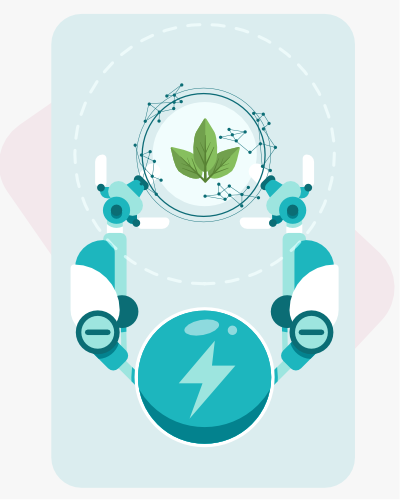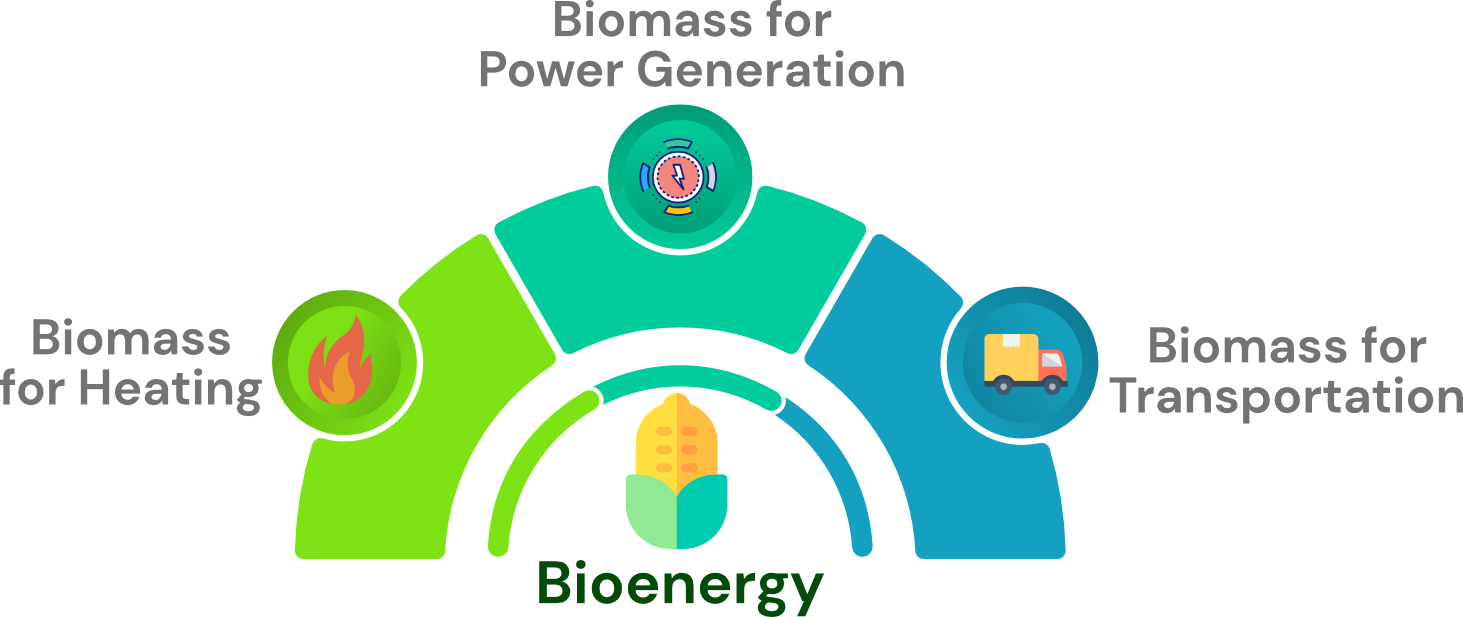Bioenergy
The pursuit of sustainable power solutions is increasingly focused on the exploitation of bioenergy derived from organic materials. This strategic shift is essential for reducing our dependence on fossil fuels and fostering a more environmentally friendly energy landscape. By harnessing the potential of biomass, bioenergy contributes significantly to climate change mitigation, enhancing energy security, and bolstering rural economies.

Solution Domain
Bioenergy manifests itself in diverse solution domains, each addressing a specific energy need in a sustainable manner. Biomass power generation involves the combustion of organic materials to produce electricity. Biofuels, such as ethanol and biomethane, offer an eco-friendly alternative to traditional transportation fuels. Anaerobic digestion converts organic waste into biogas for electricity and heat production. Biomass heating systems provide renewable energy for residential and industrial purposes. These solution domains collectively form a comprehensive portfolio, addressing the multifaceted requirements of a sustainable energy future.

Latest Trends
An emerging trend in bioenergy is the utilization of algae for biofuel production within the Biomass-to-Liquid (BTL) framework. Algae-based biofuels represent a revolutionary approach, leveraging algae’s rapid growth and high lipid content to create sustainable liquid fuels. This innovation is particularly beneficial for achieving carbon-neutral transportation, as algae absorb carbon dioxide during growth, contributing to emissions mitigation in the fuel production process.
The technology of converting algae to biofuels demonstrates efficiency and versatility. Algae cultivation avoids competition with traditional agriculture for land resources, making it a sustainable alternative. Ongoing advancements in cultivation, genetic engineering, and harvesting techniques are enhancing scalability and economic viability. Algae’s adaptability to diverse environments, including wastewater treatment facilities, positions it as a flexible and sustainable feedstock. This trend underscores the bioenergy sector’s commitment to pioneering innovative solutions that promote environmental sustainability and cleaner energy alternatives.
Detailed Impact
Biomass for Heating
|
Applications |
Biomass |
Process/Technology Involved |
|
Residential Heating |
Wood Biomass, Pelletized Biomass, Biomass Briquettes |
Traditional combustion in wood-burning stoves, pellet stoves, biomass boilers |
|
Commercial Heating |
Wood Biomass, Pelletized Biomass |
Biomass boilers, Combined Heat and Power (CHP) systems |
|
Industrial Heating |
Wood Biomass, Agricultural Biomass, Waste Wood |
Biomass-fired industrial boilers, Combined Heat and Power (CHP) systems |
|
Space Heating |
Wood Biomass, Pelletized Biomass |
Space heaters using biomass combustion for localized heating |
|
District Heating |
Wood Biomass, Municipal Solid Waste (MSW) Biomass, Energy Crops |
District heating systems with centralized biomass plants |
Biomass for Power Generation
|
Applications |
Biomass |
Process/Technology Involved |
|
Biomass Power Plants |
Wood Biomass, Agricultural Biomass |
Combustion or gasification of biomass to produce steam, driving turbines connected to generators for electricity generation |
|
Combined Heat and Power (CHP) Systems |
Wood Biomass, Pelletized Biomass, Agricultural Biomass |
Simultaneous generation of heat and electricity through combustion or gasification of biomass |
|
Industrial Boilers for Heat and Power |
Wood Biomass, Agricultural Biomass |
Combustion of biomass in boilers to generate steam for industrial processes and electricity |
|
Biomass Gasification Systems |
Wood Biomass, Agricultural Biomass, |
Thermochemical process converting biomass into synthesis gas (syngas) for electricity and heat |
|
Anaerobic Digestion for Biogas |
Agricultural Biomass, Manure, Organic Wastes |
Microbial breakdown of biomass in the absence of oxygen to produce biogas used in combined heat and power systems or for direct combustion |
|
Landfill Gas Recovery for Power Generation |
Decomposing Organic Waste in Landfills |
Collection and utilization of methane produced during the decomposition of organic matter in landfills for power generation |
|
Waste-to-Energy Facilities |
Municipal Solid Waste (MSW) Biomass |
Thermal treatment processes, including incineration or pyrolysis, to convert waste into energy for power generation |
Biofuels
|
Applications |
Biomass |
Process/Technology Involved |
|
Biodiesel for Transportation |
Vegetable Oils, Animal Fats, Algae Biomass |
Transesterification of oils and fats into biodiesel for use in diesel engines |
|
Ethanol for Transportation |
Sugarcane, Corn, Wheat, Biomass Residues |
Fermentation and distillation processes for the production of ethanol |
|
Biogas for Transportation |
Methane from Anaerobic Digestion, Biomass Residues |
Upgrading and compression of biogas for use in compressed natural gas (CNG) or liquefied natural gas (LNG) for vehicles |
|
Biohydrogen for Transportation |
Biomass Feedstocks, Water, Microorganisms |
Biological or thermochemical processes for the production of biohydrogen |
|
Pyrolysis Oil for Transportation |
Biomass Feedstocks |
Pyrolysis process to convert biomass into a liquid bio-oil |


 99529 10083
99529 10083 consult@eai.in
consult@eai.in